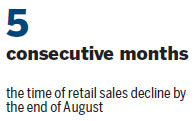HK needs new solutions to tackle end of tourism boom
Updated: 2015-09-25 09:34
By Timothy Chui in Hong Kong(HK Edition)
|
|||||||||
The SAR can re-establish its role as a conduit between the mainland and the outside world
Hong Kong must once again seek new economic solutions through the "One Country, Two Systems" principle - as a decade-long tourism boom starts to end, experts say.
Consumption by high-spending overnight visitors, a key tourism measure, fell for the first time in a decade, according to the Hong Kong Tourism Board 2014 figures. Retail sales numbers were down for five consecutive months at the end of August, according to the Hong Kong Retail Management Association.
Inbound tourism from the mainland, the city's single biggest source of visitors, fell nearly 10 percent year-on-year in July. This is a significant loss given that Individual Travel Scheme overnight tourists spent nearly twice as much as non-mainland overnight visitors.
Italian luxury brands suffering from the drop in spending since last November are preparing to reduce the number of their stores in the city, Counsel General of Italy Antonello De Riu told China Daily.
Former secretary for home affairs Patrick Ho Chi-ping said: "This is the nativist's fault. Their message was heard: That they didn't want people to mess up the streets.
"And now (the tourists) are staying away and it's only a matter of time before the drop in sales begins to affect retail sector employment," Ho added.
A continued fall in tourist numbers is likely. Would-be visitors are opting for Japan and South Korea with their weaker currencies and streamlined visa systems. Therefore, Hong Kong has to begin to move away from its past reliance on financial services, tourism and retailing, Ho said.
He noted that financial services provided the city with a high profile and high salaries, but employed few people. The retail and tourism sectors combined are a source for a huge number of local jobs. Tourism accounts for roughly 639,700 jobs.
Ho said Hong Kong had to become a catalyst again. The city could turn its fortunes around by again helping to bring the outside world to the mainland, he explained.
Ho said Hong Kong had once served this role well. It helped to bring in Fortune 500 companies when the mainland was opening up. It provided business-friendly facilities and services.
Today, these same Fortune 500 companies have headquarters in Shanghai, Tianjin and Chongqing. State-owned enterprises such as Sinopec don't need help to get outside as they are leasing prime real estate in New York City.

But some Fortune 5,000 and 50,000 companies, such as small and medium enterprises in Kentucky and Kansas City are stuck in the Midwest. They cannot afford to have an agent or offices on the mainland. Therefore, Hong Kong should reach out to them. It can also help smaller firms in the mainland's inland areas by helping them expand overseas.
Ho said more effort was needed to reach out to middle-market financial houses willing to lend to startups and smaller companies in order to connect to the global economy. This is instead of just focusing on the financial houses of Goldman Sachs, Morgan Stanley and Merrill Lynch, which have made fortunes since 1997, he said.
"Hong Kong has unique advantages as a broker as an open city, benefiting from 'One Country, Two Systems' - where the 'One Country' represented the nation's market and the separate system allowed Hong Kong to act on the sidelines, able to do what the mainland wanted to, had no time to, or was not convenient for them do - or yet to able to do," Ho said.
"Hong Kong is something more than just a connector, which is very passive. We are more than just a middle man. We make things happen, something more active and proactive than just being connected," he stressed.
tim@chinadailyhk.com
(HK Edition 09/25/2015 page8)